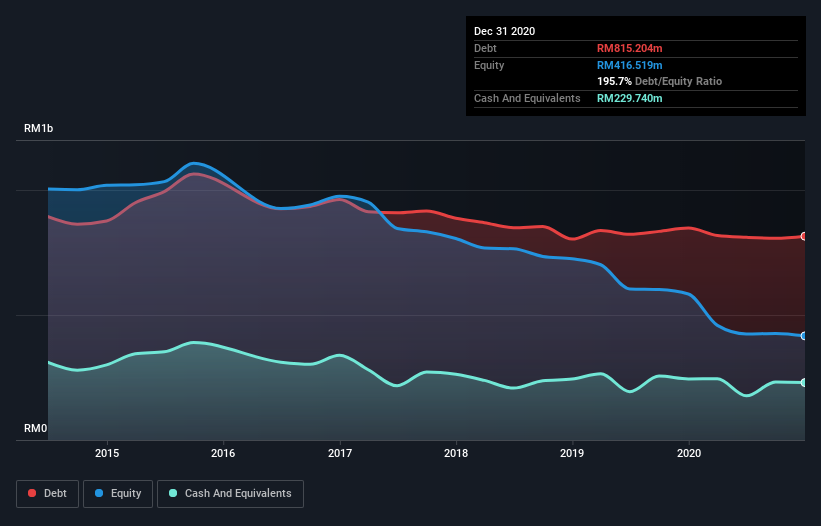- Malaysia
- /
- Industrials
- /
- KLSE:MUIIND
Is Malayan United Industries Berhad (KLSE:MUIIND) Using Debt Sensibly?

Legendary fund manager Li Lu (who Charlie Munger backed) once said, 'The biggest investment risk is not the volatility of prices, but whether you will suffer a permanent loss of capital.' So it seems the smart money knows that debt - which is usually involved in bankruptcies - is a very important factor, when you assess how risky a company is. We note that Malayan United Industries Berhad (KLSE:MUIIND) does have debt on its balance sheet. But should shareholders be worried about its use of debt?
What Risk Does Debt Bring?
Debt assists a business until the business has trouble paying it off, either with new capital or with free cash flow. Part and parcel of capitalism is the process of 'creative destruction' where failed businesses are mercilessly liquidated by their bankers. While that is not too common, we often do see indebted companies permanently diluting shareholders because lenders force them to raise capital at a distressed price. By replacing dilution, though, debt can be an extremely good tool for businesses that need capital to invest in growth at high rates of return. The first thing to do when considering how much debt a business uses is to look at its cash and debt together.
Check out our latest analysis for Malayan United Industries Berhad
How Much Debt Does Malayan United Industries Berhad Carry?
The chart below, which you can click on for greater detail, shows that Malayan United Industries Berhad had RM815.2m in debt in December 2020; about the same as the year before. However, it also had RM229.7m in cash, and so its net debt is RM585.5m.

How Strong Is Malayan United Industries Berhad's Balance Sheet?
Zooming in on the latest balance sheet data, we can see that Malayan United Industries Berhad had liabilities of RM259.9m due within 12 months and liabilities of RM737.0m due beyond that. On the other hand, it had cash of RM229.7m and RM143.1m worth of receivables due within a year. So its liabilities outweigh the sum of its cash and (near-term) receivables by RM624.1m.
This deficit casts a shadow over the RM278.6m company, like a colossus towering over mere mortals. So we'd watch its balance sheet closely, without a doubt. At the end of the day, Malayan United Industries Berhad would probably need a major re-capitalization if its creditors were to demand repayment. When analysing debt levels, the balance sheet is the obvious place to start. But you can't view debt in total isolation; since Malayan United Industries Berhad will need earnings to service that debt. So if you're keen to discover more about its earnings, it might be worth checking out this graph of its long term earnings trend.
In the last year Malayan United Industries Berhad had a loss before interest and tax, and actually shrunk its revenue by 50%, to RM192m. That makes us nervous, to say the least.
Caveat Emptor
Not only did Malayan United Industries Berhad's revenue slip over the last twelve months, but it also produced negative earnings before interest and tax (EBIT). Its EBIT loss was a whopping RM48m. Considering that alongside the liabilities mentioned above make us nervous about the company. We'd want to see some strong near-term improvements before getting too interested in the stock. Not least because it had negative free cash flow of RM15m over the last twelve months. So suffice it to say we consider the stock to be risky. The balance sheet is clearly the area to focus on when you are analysing debt. However, not all investment risk resides within the balance sheet - far from it. These risks can be hard to spot. Every company has them, and we've spotted 2 warning signs for Malayan United Industries Berhad (of which 1 is a bit unpleasant!) you should know about.
Of course, if you're the type of investor who prefers buying stocks without the burden of debt, then don't hesitate to discover our exclusive list of net cash growth stocks, today.
If you’re looking to trade a wide range of investments, open an account with the lowest-cost* platform trusted by professionals, Interactive Brokers. Their clients from over 200 countries and territories trade stocks, options, futures, forex, bonds and funds worldwide from a single integrated account. Promoted
New: Manage All Your Stock Portfolios in One Place
We've created the ultimate portfolio companion for stock investors, and it's free.
• Connect an unlimited number of Portfolios and see your total in one currency
• Be alerted to new Warning Signs or Risks via email or mobile
• Track the Fair Value of your stocks
This article by Simply Wall St is general in nature. It does not constitute a recommendation to buy or sell any stock, and does not take account of your objectives, or your financial situation. We aim to bring you long-term focused analysis driven by fundamental data. Note that our analysis may not factor in the latest price-sensitive company announcements or qualitative material. Simply Wall St has no position in any stocks mentioned.
*Interactive Brokers Rated Lowest Cost Broker by StockBrokers.com Annual Online Review 2020
Have feedback on this article? Concerned about the content? Get in touch with us directly. Alternatively, email editorial-team (at) simplywallst.com.
About KLSE:MUIIND
Malayan United Industries Berhad
An investment holding company, primarily engages in the retailing, hotel, property, food, fast food chain, and financial service businesses in Malaysia, the Asia-Pacific, Australia, North America, and the United Kingdom.
Low and slightly overvalued.
Market Insights
Community Narratives



